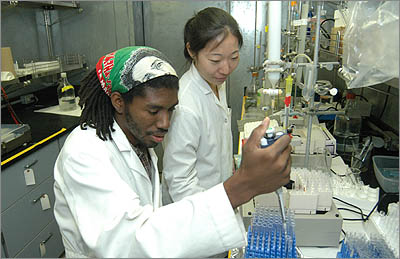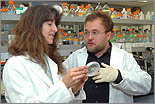| CSUF
Program Stresses Research Careers |
|||||
|
|||||
| Minority Access to Research Careers
program exposes students to research and skills that will help them
enter and succeed in graduate schools.
July 7, 2005 :: No. 2 Ronald Coleman peers into the Petri dish and discovers to his dismay that there are no transformed colonies of the green algae he is studying. He grabs another from a series of dishes and is rewarded when he sees transformants that may be producing the antibody he introduced. Lawrence Gray works in another lab exploring how copper is transported through the body. Both young men are participants in Cal State Fullerton’s Minority Access to Research Careers (MARC) program. Thanks to funding from the National Institutes of Health, the 10-year-old program offers underrepresented students opportunities to explore careers in research. The goal, says program director Amybeth Cohen, associate professor of biological science, is to expose undergraduate students to the type of research and skills that will help them enter and succeed in graduate programs. “The idea is to give them the preparation to compete for slots at the top schools in the country.” Students selected for the program must carry at least a 3.2 grade-point-average and be interested in research as a career, said Cohen. Program participants are required to take specific science courses; conduct an average of 15 hours of research per week during both semesters of the academic year and full time for eight weeks in the summer; conduct a specific research project that will culminate in a senior thesis; and defend their findings before a thesis committee at the end of the program. MARC scholars attend a weekly seminar where they read scientific papers, learn how to develop research presentations and hear from guest speakers that they invite to the course. They also are expected to attend and deliver presentations on their work at local and national professional meetings. In addition to four scholars working in university labs on campus, there are two MARC scholars in England, where they are gaining exposure to the level and atmosphere of a doctoral-level research facility. The program provides each student with an annual stipend of about $10,000, as well as funding for travel, supplies and materials. MARC also pays participants’ school fees and provides a GRE preparation course. This fall, six students will enter the program, thanks to a $247,080 NIH grant. Unlike previous years when scholars came from the ranks of biological science and biochemistry majors, the new class of MARC scholars will include a psychology major. “It’s a lot of hard work,” said Cohen, who has mentored four students and is currently working with Coleman and another participant. “We expect a lot of them. But if they rise to the challenge, they do well.” Since 1995, 23 students have completed the two-year program and gone on to graduate and doctorate programs at UC Irvine, UC San Diego and USC. Coleman, a resident of Covina, will begin a doctorate program this fall at Scripps Research Institute, while Gray, of Placentia, will work toward a Ph.D. at Oregon Health and Science University.
|
|

